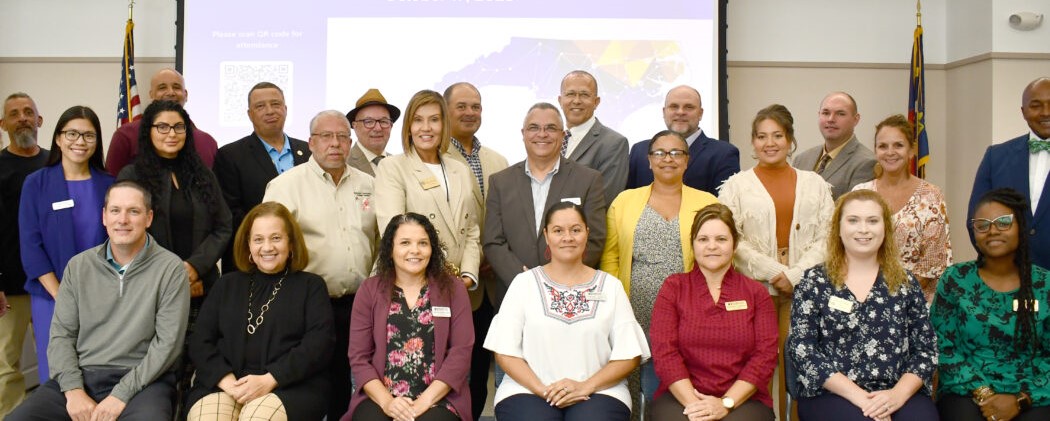
The Robeson County Education to Workforce Council Commission met earlier this month at Robeson Community College to discuss ways to implement strategies to help North Carolina reach its educational attainment goal, as passed by legislatures in House Bill 664, which states that “to ensure that the State remains economically competitive, the State shall ensure that by the year 2030, 2 million 25- to 44-year olds will have completed a high-quality credential or postsecondary degree.”
“We want to pull everyone in the county together to reach this goal,” stated Eric Freeman, the executive vice president of Robeson Community College, in a press release. “We want to do everything we can to ensure we have a bright future in Robeson County.”
It is estimated that as we reach the year 2030, approximately 67 percent of all jobs in NC will demand a postsecondary credential, revealing significant disparities within historically marginalized communities.
The meeting at RCC included leaders from UNCP, the Public Schools of Robeson County, UNC Southeastern, the Lumbee Tribe, Robeson County Administration, Communities in Schools, HealthKeeperz, Robeson County Church and Community Center, myFutureNC, and Robeson Community College.
During the session, participants discussed the unique challenges faced in Robeson County and ways to overcome them, as well as the collaboration opportunities within the region. Robeson Community College included quotes from the conversation in a recent news release.
“We have a lot of socioeconomic barriers,” RCC President Melissa Singler stated. “We have to become more creative in our outreach and in overcoming the struggles many of our students face.”
Another group pointed out the existing transportation needs of the county.
“With gas being near $5.00 a gallon, it’s hard for some in our community,” Tito Massol with HealthKeeperz stated. “The size of our county is a challenge and transportation is a big hurdle for those who have to commute a long way to get to RCC or UNCP… adding sidewalks where our citizens could walk or ride their bikes safely would also be a great addition.”
Collaboration continues to be a strong point within Robeson County and has proven to be an asset in meeting the local needs of the community.
“When Hurricane Florence hit, there was a huge collaboration effort,” stated Kelly Blue, the Robeson County manager. “Robeson Community College opened the campus for the medical needs of those who needed specialized care during the evacuations… these are the kinds of collaborations that are vital to meeting the needs of our county.”
“We are one of 17 counties in the State with a community college and a university,” Blue said. “That makes us very unique and gives us an advantage in becoming prepared to meet the new demands of the industry through partnerships with RCC, UNCP, and PSRC.”
Some suggestions were made for ways that RCC could motivate more young people to continue their education after high school, such as exposing youth to various occupations at an early age, hosting a special career fair for high school graduates, increasing apprenticeship and internship opportunities with industry and getting more success stories out on students who have earned postsecondary credentials.
myFutureNC’s Dr. Robert Locklear shared that 43 percent of those living in North Carolina between the ages of 35 and 44 did not earn a family-sustaining wage in 2021.
“We want to achieve education equity for every student regardless of race, geographic location, or socioeconomic condition,” said Locklear. “In June 2023, there were approximately 368,000 job openings but 1.2 million North Carolina residents were without a postsecondary credential and many were unable to meet the qualifications to fill those vacancies.”
Robeson Community College has increased its adult learners by 34 percent.
“Many of those learners came back to complete a postsecondary credential or came back and completed a degree,” stated Freeman. “We increased accessibility to our workforce development programs when covid hit and we also re-examined which programs were most needed and relevant, and we just kept working to make sure we were serving our community with the training they needed.”
Leaders acknowledge there is still much more work to be done; however, as Dr. Danny Stedman with Communities in Schools stated, “This is a great start.”

Kristen Botts co-founded the program with her husband, Nathan Botts, who is a Veteran himself. Photos provided by Kristen Botts.An organization helping Veterans live a full life after their service in the U.S. Military wants to connect Veterans and d

Patrick NoblesHuntington Bancshares Incorporated announced on Feb. 2 that it has closed its merger with Cadence Bank, a regional bank headquartered in Houston, Texas and Tupelo, Miss. This strategic partnership accelerates Huntington’s growth in

There is extensive dialogue surrounding Fayetteville as a travel destination or city aimed at recruiting new businesses and new residents. As someone who moved here from out of state, I thought it could be fun to share my personal experience as